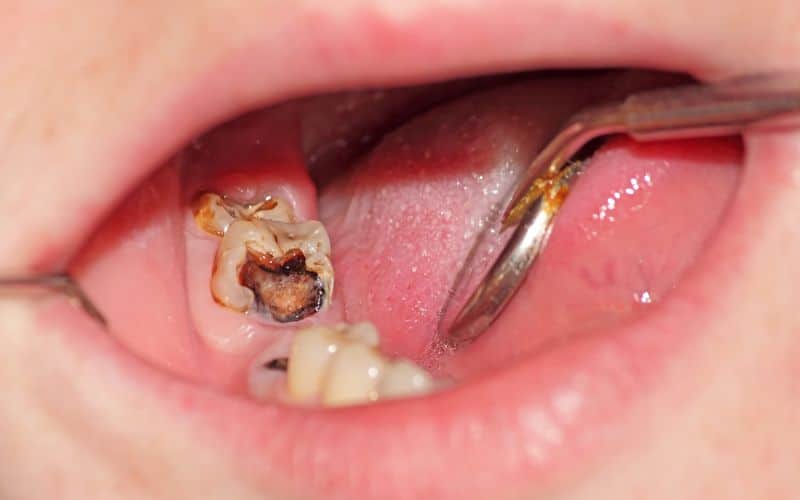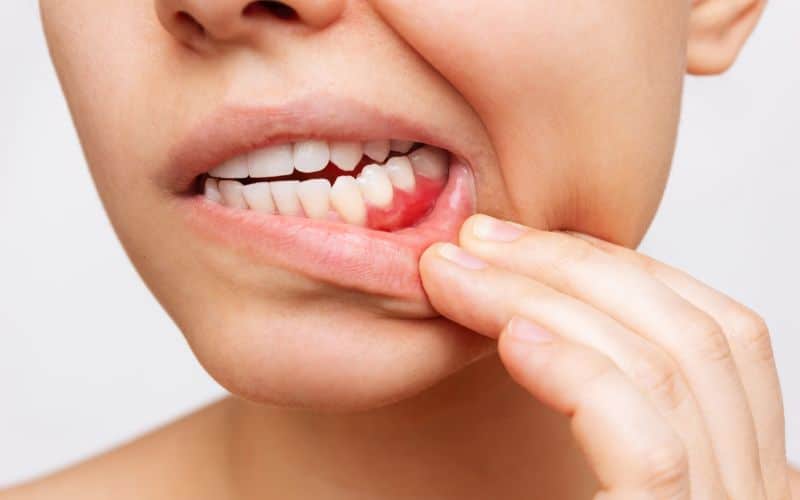Dental problems can be a significant cause of weight loss in many people. Tooth decay, gum disease, and other oral health issues can lead to inflammation, pain, and difficulty eating, which can all contribute to weight loss. In some cases, dental issues can also lead to malnutrition, which can further exacerbate weight loss.
Research has shown that there is a strong link between dental health and overall health. Poor dental health can contribute to a range of health problems, including heart disease, stroke, and diabetes. It is essential to take care of your teeth and gums to maintain good overall health and prevent weight loss due to dental problems. Regular dental check-ups, brushing and flossing regularly, and eating a healthy diet are all essential steps you can take to maintain good dental health and prevent weight loss.
Contents
Understanding Dental Problems
Dental problems are common and can range from mild to severe. They can affect people of all ages and can lead to various complications, including weight loss. In this section, we will discuss some of the most common dental problems and their impact on weight.
Gum Disease
Gum disease, also known as periodontitis, is a bacterial infection that affects the gums and the bone that supports the teeth. It can lead to tooth loss and other complications, including weight loss. According to a study published in Health, people with gum disease are more likely to experience weight loss than those without the disease. The inflammation caused by gum disease can interfere with the body's ability to absorb nutrients, leading to weight loss.
Oral Cancer
Oral cancer is a type of cancer that affects the mouth and throat. It can cause various symptoms, including weight loss, difficulty swallowing, and mouth sores. According to the American Cancer Society, people with oral cancer often experience unintentional weight loss due to the cancer's effect on the body's metabolism.
Tooth Decay

Tooth decay is a common dental problem that occurs when bacteria in the mouth produce acid that erodes the tooth's enamel. It can lead to various complications, including weight loss. When tooth decay affects the ability to chew food properly, people may avoid eating certain foods, leading to a decrease in calorie intake and weight loss.
Dry Mouth
Dry mouth, also known as xerostomia, is a condition that occurs when the mouth does not produce enough saliva. It can lead to various complications, including weight loss. Saliva helps break down food, making it easier to swallow and digest. When the mouth is dry, people may experience difficulty eating and may avoid certain foods, leading to weight loss.
In conclusion, dental problems can have a significant impact on weight. Gum disease, oral cancer, tooth decay, and dry mouth are just a few of the many dental problems that can lead to weight loss. If you are experiencing any dental problems, it is essential to seek treatment from a qualified dental professional to prevent further complications.
Link Between Dental Problems and Weight Loss
Dental problems can have a significant impact on weight loss. There are several ways in which dental problems can affect a person's eating habits and overall health. Here are a few sub-sections that explain the effects of dental problems on eating habits and the psychological impact of dental problems.
Effects of Dental Problems on Eating Habits
Dental problems such as tooth decay, gum disease, and missing teeth can make it difficult for a person to eat certain foods. This can lead to a decrease in the variety of foods a person can eat, which can impact their overall nutrition. For example, a person with missing teeth may find it difficult to eat crunchy fruits and vegetables, which can impact their intake of important vitamins and minerals.
Furthermore, dental problems can cause pain and discomfort while eating, which can lead to a decrease in appetite. This can result in unintentional weight loss, which can be a cause for concern, especially in older adults.
Psychological Impact of Dental Problems
Dental problems can also have a psychological impact on a person's overall health. For example, a person with missing teeth may feel self-conscious and avoid social situations that involve eating. This can lead to social isolation and depression, which can impact a person's mental health and well-being.
Additionally, dental problems can cause pain and discomfort, which can lead to anxiety and stress. This can impact a person's ability to sleep, which can have a negative impact on their overall health and well-being.
In conclusion, dental problems can have a significant impact on a person's weight loss journey. It is important to address dental problems promptly to ensure that they do not impact a person's overall health and well-being.
Common Dental Problems Leading to Weight Loss
When it comes to maintaining a healthy weight, dental problems may not be the first thing that comes to mind. However, poor oral health can lead to weight loss, especially in older adults. Here are some common dental problems that can contribute to weight loss:
Periodontal Disease

Periodontal disease, also known as gum disease, is a bacterial infection that affects the tissues that support the teeth. It can cause inflammation, bleeding, and eventually, tooth loss. In addition to affecting oral health, periodontal disease has been linked to other health problems, including heart disease, stroke, and diabetes.
Studies have also found a link between periodontal disease and weight loss. One theory is that the inflammation caused by periodontal disease can interfere with the body's ability to absorb nutrients, leading to weight loss.
Tooth Decay
Tooth decay, also known as cavities, is a common dental problem caused by bacteria that produce acid that erodes tooth enamel. If left untreated, tooth decay can lead to tooth loss and other health problems.
In addition to affecting oral health, tooth decay can also contribute to weight loss. This is because tooth decay can make it difficult to eat certain foods, especially those that are hard or require a lot of chewing. As a result, people with tooth decay may avoid these foods, leading to a limited diet and weight loss.
Oral Cancer
Oral cancer is a type of cancer that affects the mouth and throat. It can cause symptoms such as mouth sores, difficulty swallowing, and weight loss. In fact, unintentional weight loss is one of the most common symptoms of oral cancer.
If you are experiencing any of these dental problems, it is important to see a dentist as soon as possible. In addition to treating the dental problem, your dentist can also help you maintain a healthy weight by recommending a diet that is easy to chew and swallow.
Preventing Weight Loss Due to Dental Problems
Maintaining good dental health is essential for overall well-being. Dental problems can not only cause pain and discomfort, but they can also lead to weight loss. Here are some steps you can take to prevent weight loss due to dental problems.
Regular Dental Checkups
Regular dental checkups are essential for maintaining good dental health. During these checkups, the dentist can identify any dental problems that may be causing weight loss. For example, gum disease can cause inflammation, which can lead to weight loss. By identifying and treating dental problems early, you can prevent weight loss and maintain good overall health.
Healthy Eating Habits
Healthy eating habits are essential for maintaining good dental health. A diet that is rich in fruits, vegetables, and whole grains can help prevent dental problems. These foods are rich in vitamins and minerals that are essential for healthy teeth and gums. Additionally, avoiding sugary and acidic foods can help prevent dental problems.
Oral Hygiene Practices

Good oral hygiene practices are essential for maintaining good dental health. Brushing your teeth twice a day and flossing daily can help prevent dental problems. Additionally, using mouthwash can help kill bacteria that can cause dental problems. It is also essential to replace your toothbrush every three to four months to ensure that it is effective.
In conclusion, by following these steps, you can prevent weight loss due to dental problems. Regular dental checkups, healthy eating habits, and good oral hygiene practices are essential for maintaining good dental health and preventing weight loss.
Conclusion
In conclusion, dental health is an important factor to consider when addressing weight loss in older adults. Dentate status has been identified as a significant risk factor for clinically significant weight loss among community-dwelling older adults [1]. Additionally, poor dental condition has been found to be a factor of imbalance of the nutritional status of older adults [5].
Research has also shown that weight loss can have a negative impact on oral health. For example, a study found that weight loss of more than 5% was associated with a higher DMF index [5]. It is important to note that bariatric surgery, which is an effective therapeutic modality for extreme obesity, is associated with risk factors affecting oral health [4].
Therefore, it is crucial for healthcare professionals to consider dental health when designing weight loss interventions for older adults. This can include regular dental check-ups and addressing dental issues such as denture fit and oral pain. Additionally, incorporating a balanced diet that includes foods that promote dental health, such as fruits and vegetables, can help maintain both oral and overall health [2].
Overall, addressing dental health in weight loss interventions can help promote better outcomes for older adults.
[1] https://academic.oup.com/biomedgerontology/article/55/7/M366/2948076
[2] https://www.health.com/condition/obesity/obesity-periodontal-disease-inflammation
[4] https://www.ncbi.nlm.nih.gov/pmc/articles/PMC5467377/
[5] https://link.springer.com/article/10.1007/s00784-021-04097-y






